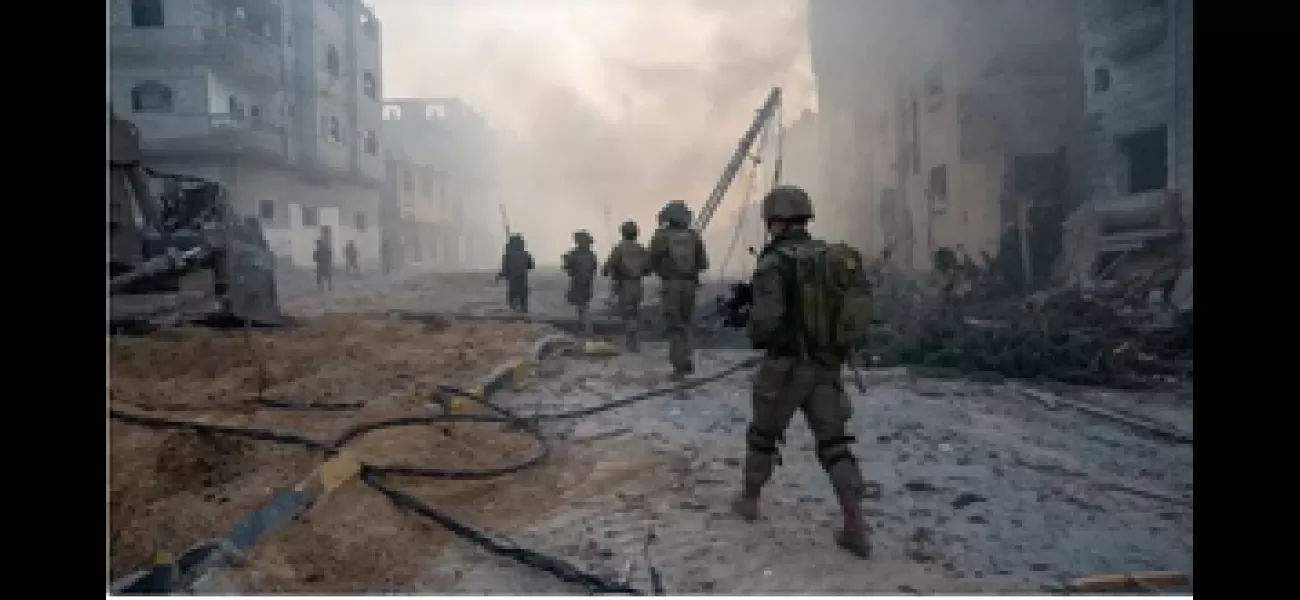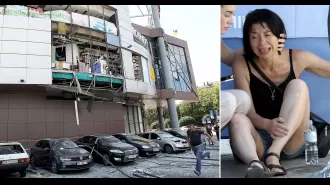As Israel advances into Rafah, Hamas regroups in other parts of uncontrolled Gaza.
Israeli forces are fighting against Palestinian militants in Gaza, including in areas that were previously cleared, as Hamas has regrouped in the security vacuum.
May 12th 2024.

The situation in Gaza has become more intense as Israeli forces continue to battle against Palestinian militants. The conflict has spread to areas that were previously considered cleared by the military, as Hamas has taken advantage of the security vacuum to regroup. The southern city of Rafah is now being portrayed as Hamas' last stronghold, with Israel claiming that they must invade in order to achieve their goal of dismantling the group and rescuing hostages. However, this limited operation has now expanded, forcing hundreds of thousands of people to flee and causing concern from neighboring Egypt, who fears for the stability of their long-standing peace treaty with Israel.
But it's not just Rafah that poses a challenge for Israel. The rest of Gaza is also proving to be a fertile ground for Hamas, as the country has yet to present a detailed plan for post-war governance. All they have stated is that they will maintain security control over the territory, which is home to over 2 million Palestinians. Prime Minister Benjamin Netanyahu has rejected the post-war plans proposed by the United States, which involve the Palestinian Authority governing Gaza with support from Arab and Muslim countries. This plan relies on progress towards the creation of a Palestinian state, something that Netanyahu's government strongly opposes.
With both Israel and the US at odds, the lack of a functioning government in Gaza has led to a breakdown in public order and allowed Hamas to regain a foothold in even the most heavily damaged areas. The northern Gaza Strip, which has been largely isolated by Israeli forces for months, has recently been subjected to heavy bombardment and is now facing a severe famine according to UN officials.
The residents of the urban Jabaliya refugee camp and the Zeitoun area have reported intense bombing and have been urged to relocate to safer areas. However, first responders from the Palestinian Civil Defence have been unable to respond to multiple calls for help due to the ongoing clashes. In the south, Israeli troops have been battling militants in Rafah since seizing the nearby border crossing with Egypt last week. The top Israeli military spokesman, Rear Adm. Daniel Hagari, confirmed that the fighting is happening in all parts of Gaza.
The frustration among many Israelis is growing as the conflict enters its eighth month. Columnist Ben Caspit wrote in Israel's Maariv daily, drawing comparisons with the American wars in Iraq and Afghanistan. He emphasized that toppling Hamas' regime without a viable alternative would be impossible and that only Gazans, with support from the international community, can govern Gaza after the war.
The recent violence has also resulted in casualties on both sides. Five Israeli soldiers were killed in Zeitoun, while Palestinian militants launched rockets towards the city of Beersheba. The United Nations' agency for Palestinian refugees reported that over 300,000 people have fled Rafah since the operation began there, with most seeking shelter in already overcrowded areas.
The situation at the Rafah crossing, the main entry point for aid, has also been affected. Israeli troops have taken control of the Gaza side, forcing it to shut down. Egypt, who has refused to coordinate with Israel on aid delivery, has expressed concerns about the offensive, stating that it puts their peace treaty with Israel at risk. The United States has also condemned the violence and has stated that there is evidence of Israel breaching international laws protecting civilians. However, Israel denies these allegations, stating that they try to avoid harming civilians and blaming Hamas for fighting in densely populated areas.
The conflict began in October when Hamas and other militants attacked southern Israel, resulting in the death of around 1,200 people and the capture of over 250 hostages. Despite the ongoing efforts to end the violence, Hamas still holds around 100 captives and the remains of over 30. The death toll in Gaza has surpassed 34,800, with the majority being women and children, according to the Health Ministry. The high number of civilian casualties has raised international concerns and calls for an end to the conflict.
But it's not just Rafah that poses a challenge for Israel. The rest of Gaza is also proving to be a fertile ground for Hamas, as the country has yet to present a detailed plan for post-war governance. All they have stated is that they will maintain security control over the territory, which is home to over 2 million Palestinians. Prime Minister Benjamin Netanyahu has rejected the post-war plans proposed by the United States, which involve the Palestinian Authority governing Gaza with support from Arab and Muslim countries. This plan relies on progress towards the creation of a Palestinian state, something that Netanyahu's government strongly opposes.
With both Israel and the US at odds, the lack of a functioning government in Gaza has led to a breakdown in public order and allowed Hamas to regain a foothold in even the most heavily damaged areas. The northern Gaza Strip, which has been largely isolated by Israeli forces for months, has recently been subjected to heavy bombardment and is now facing a severe famine according to UN officials.
The residents of the urban Jabaliya refugee camp and the Zeitoun area have reported intense bombing and have been urged to relocate to safer areas. However, first responders from the Palestinian Civil Defence have been unable to respond to multiple calls for help due to the ongoing clashes. In the south, Israeli troops have been battling militants in Rafah since seizing the nearby border crossing with Egypt last week. The top Israeli military spokesman, Rear Adm. Daniel Hagari, confirmed that the fighting is happening in all parts of Gaza.
The frustration among many Israelis is growing as the conflict enters its eighth month. Columnist Ben Caspit wrote in Israel's Maariv daily, drawing comparisons with the American wars in Iraq and Afghanistan. He emphasized that toppling Hamas' regime without a viable alternative would be impossible and that only Gazans, with support from the international community, can govern Gaza after the war.
The recent violence has also resulted in casualties on both sides. Five Israeli soldiers were killed in Zeitoun, while Palestinian militants launched rockets towards the city of Beersheba. The United Nations' agency for Palestinian refugees reported that over 300,000 people have fled Rafah since the operation began there, with most seeking shelter in already overcrowded areas.
The situation at the Rafah crossing, the main entry point for aid, has also been affected. Israeli troops have taken control of the Gaza side, forcing it to shut down. Egypt, who has refused to coordinate with Israel on aid delivery, has expressed concerns about the offensive, stating that it puts their peace treaty with Israel at risk. The United States has also condemned the violence and has stated that there is evidence of Israel breaching international laws protecting civilians. However, Israel denies these allegations, stating that they try to avoid harming civilians and blaming Hamas for fighting in densely populated areas.
The conflict began in October when Hamas and other militants attacked southern Israel, resulting in the death of around 1,200 people and the capture of over 250 hostages. Despite the ongoing efforts to end the violence, Hamas still holds around 100 captives and the remains of over 30. The death toll in Gaza has surpassed 34,800, with the majority being women and children, according to the Health Ministry. The high number of civilian casualties has raised international concerns and calls for an end to the conflict.
[This article has been trending online recently and has been generated with AI. Your feed is customized.]
[Generative AI is experimental.]
0
0
Submit Comment





